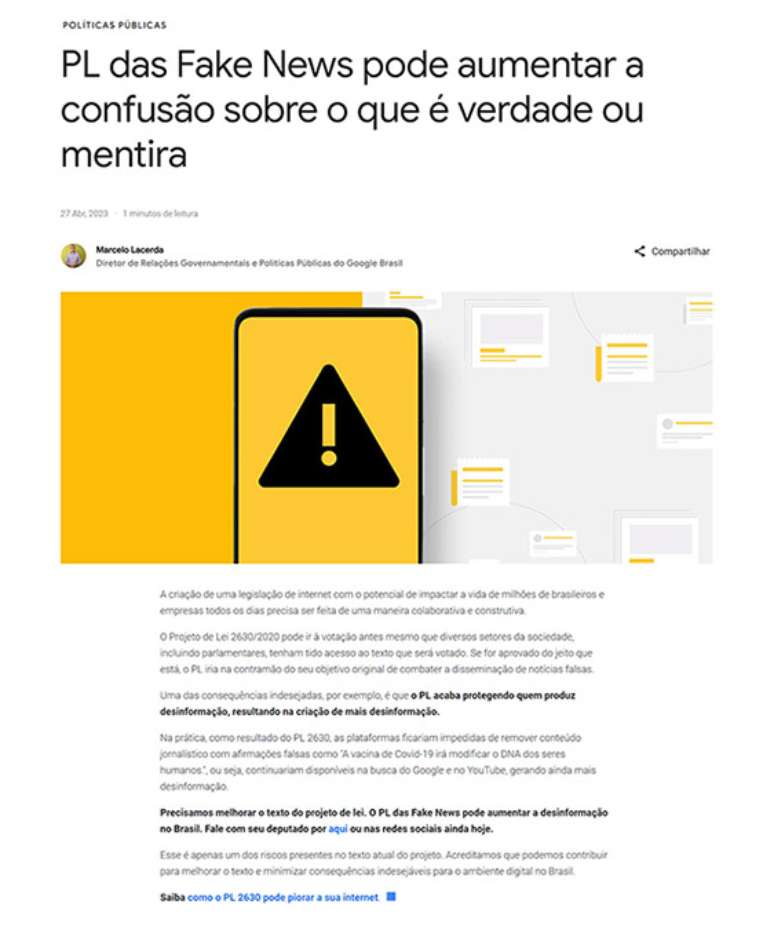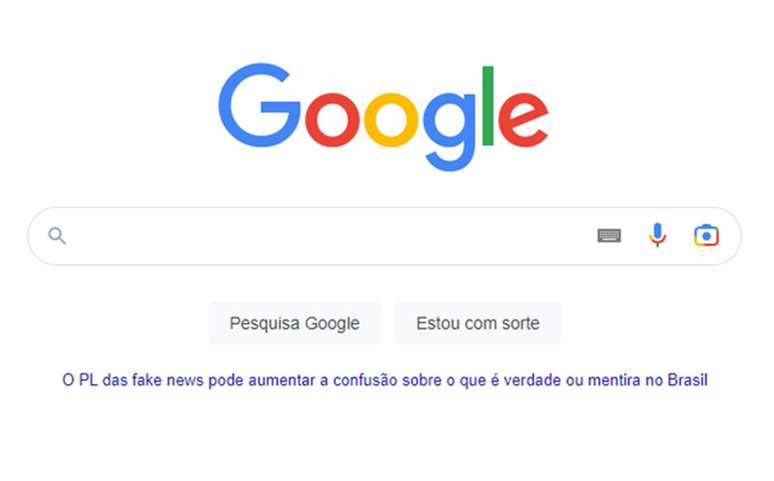The Google platform has left aside impartiality to talk about politics in Brazil. The search engine placed a campaign link on its homepage against the proposed regulation of fake news. Titled “The Fake News PL may increase confusion about what is true or false in Brazil,” the link points to an article by Marcelo Lacerda, the company’s director of government relations and public policy in the country.
According to Google, the project could make the Internet worse and generate unintended consequences if the current text is approved without further discussion.
In reality, this is already the second text signed by the representative of the research platform against the bill, always listing points deemed “worrisome” worthy of Big Brother (the original, from “1984”), such as the attribution of “extensive powers to a government body to decide what Brazilians can see on the internet”.
The company also promotes the hashtag #MaisDebatePL2630, lobbied federal deputies and contacted influencers in clear cases of political lobbying. This action generated criticism from the project’s speaker, federal deputy Orlando Silva (PCdoB), who carried out a series of attacks on technology companies during the Labor Day event sponsored by union headquarters in downtown São Paulo.
Orlando Silva said big tech companies, especially Google, are playing a “dirty game” to negatively influence the vote on the bill in Brazil’s Congress. The congressman criticized the use of economic strength and market presence to distort political debate, and cited the shrinking reach of the Sleeping Giants network on Twitter as an example.
Google’s action has also generated a reaction from the Minister of Justice and Public Security, Flávio Dino, who sees the possibility of abusive practices by the technology company. The minister stated on his Twitter account that he was submitting the matter to the analysis of the National Consumer Secretariat, an agency of the Ministry of Justice, in view of the possibility of abusive practices by companies.
With the possibility of postponing the vote on the project, the controversy surrounding Fake News PL continues. While the tech companies defend a more in-depth discussion on the matter, the speaker and the government try to move forward with the proposal to combat the spread of false information on the Internet.
The government took the lead in the discussion, because the tech companies washed their hands and allowed fake news to cause the January 8 act of vandalism against the Three Powers constituted in Brazil.
Importantly, a similar law is already being implemented in Europe and is expected to be adopted in several other countries, in an irreversible trend to curb permissiveness on the Internet.
As in Brazil, the European Union’s Digital Services Law (DSA) has also irked tech companies. After all, it forces them to do the least they refuse to do: adopt new mechanisms that allow users to report illegal content online and cooperate with trusted flaggers to identify and remove this type of content, as well as the ability to challenge moderation content decisions. of platforms based on new mandatory information for users when content is removed or restricted. The DSA also calls for greater transparency of the algorithms used to recommend content, protection of minors on any platform, oversight of big technologies on their actions to prevent abuse of their systems, risk management measures and action against misinformation or manipulation election, cyber violence against women or minors and measures against Internet scammers.
The Brazilian proposal includes fines for violating the law and remuneration options for the use of copyrighted material, two points that have produced angrier comments from Google.
See below the official posts by Google against fake news PL.


Source: Terra
Ashley Fitzgerald is a journalist and author at Gossipify, known for her coverage of famous people and their lives. She writes about a wide range of topics, including celebrities, influencers, social media stars, and public figures. Her articles are known for their in-depth analysis and unique perspective. She is respected for her ability to keep readers up to date with the latest news and trends of the famous people.









